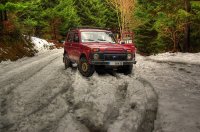-
You are here:
- Homepage »
- France »
- Rhone-Alpes » Saint-Nizier-du-Moucherotte

Saint-Nizier-du-Moucherotte Destination Guide
Discover Saint-Nizier-du-Moucherotte in France
Saint-Nizier-du-Moucherotte in the region of Rhône-Alpes with its 871 habitants is a town located in France - some 298 mi or ( 479 km ) South-East of Paris , the country's capital .
Local time in Saint-Nizier-du-Moucherotte is now 09:30 PM (Sunday) . The local timezone is named " Europe/Paris " with a UTC offset of 1 hours. Depending on your flexibility, these larger cities might be interesting for you: Geneva, Valence, Saint-Nizier-du-Moucherotte, Saint-Martin-d'Hères, and Saint-Étienne. When in this area, you might want to check out Geneva . We found some clip posted online . Scroll down to see the most favourite one or select the video collection in the navigation. Are you looking for some initial hints on what might be interesting in Saint-Nizier-du-Moucherotte ? We have collected some references on our attractions page.
Videos
hadra festival 2012 - samedi matin
Prise le samedi au alentour de midi, enfin je crois!!! ^^ Une gadoue party digne de woodstock ..
Guci par les 38 tonnes
à la fête de la musqiu2 2007 in grenoble city ..
Trophée Andros 2011 - Lans en Vercors
Vidéo filmé avec une caméra Flip Ultra HD et monté sur FlipShare ! ..
Mongoose Teocali /// Kenda Excavator 2.35
..
Videos provided by Youtube are under the copyright of their owners.
Interesting facts about this location
Gouffre Berger
The Gouffre Berger is a French cave discovered on 24 May 1953, by Joseph Berger, Bouvet, Ruiz de Arcaute and Marc Jouffray. From 1953 to 1963, it was regarded as the deepest cave in the world at −1,122 metres, relinquishing this title to the previous contender, Pierre Saint Martin in 1964, after further exploration. The Gouffre Berger is now ranked 28th of the deepest caves in the world, and the 4th in France.
Located at 45.22 5.60 (Lat./Long.); Less than 6 km away
Drac (river)
The Drac is a 130 km long river in southeastern France, left tributary of the Isère. It is formed by the confluence of the Drac Noir and the Drac Blanc, that both rise in the southern part of the Massif des Écrins. It flows through several reservoirs, including the Lac de Monteynard-Avignonet. It flows into the Isère near Grenoble. Its major tributary is the Romanche.
Located at 45.22 5.68 (Lat./Long.); Less than 6 km away
Le Magasin
Founded in 1986, Le Magasin - Centre National d'Art Contemporain is housed in an industrial hall, built for the 1900 Paris World's Fair by the workshops of Gustave Eiffel. Manufacturers Bouchayer and Viallet, working in the area of hydroelectric equipment, bought the iron structure and reassembled it in Grenoble, France. Its exhibitions focus on contemporary art.
Located at 45.19 5.70 (Lat./Long.); Less than 6 km away
Stade Lesdiguières
Stade Lesdiguières is a multi-purpose stadium in Grenoble, France. The stadium holds 12,000. It is the home of the FC Grenoble rugby union club. The name of the stadium was given in honor of François de Bonne, Duke of Lesdiguières, died in 1626. The Stadium is made up of 5 stands, the largest of which is the Tribune Présidentielle to the south. The Tribune Tennis is on the east side, so called because it is next to a tennis club, and is the only stand which is uncovered.
Located at 45.17 5.71 (Lat./Long.); Less than 6 km away
Institut Laue–Langevin
The Institut Laue–Langevin, or ILL, is an internationally-financed scientific facility, situated in Grenoble, France. It is one of the world centres for research using neutrons. Founded in 1967 and honouring the physicists Max von Laue and Paul Langevin, the ILL currently provides one of the most intense neutron sources in the world and the most intense continuous neutron flux in the world in the moderator region: 1.5x10 neutrons per second per cm, with a thermal power of 58.3 MW.
Located at 45.21 5.69 (Lat./Long.); Less than 6 km away
Pictures
Historical Weather
Related Locations
Information of geographic nature is based on public data provided by geonames.org, CIA world facts book, Unesco, DBpedia and wikipedia. Weather is based on NOAA GFS.

